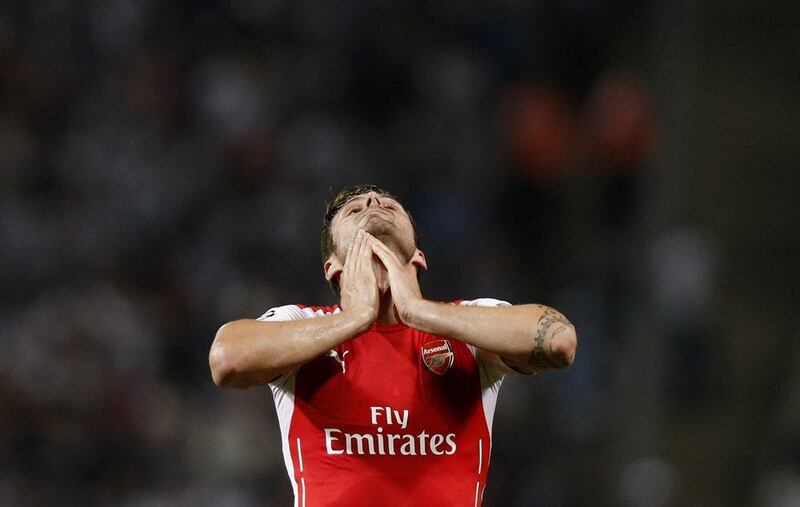Five Premier League wins in a row at the end of last season, followed by last Saturday’s uneasy victory over Crystal Palace.
A victory in the FA Cup final to end a nine-year trophy drought, and the momentum maintained in a 3-0 Community Shield victory over Manchester City.
Even a 0-0 draw away to Besiktas in the Champions League play-off is a decent result, despite a certain frustration surrounding Aaron Ramsey’s red card and Olivier Giroud’s form.
Everything, really, has been moving in the right direction for Arsenal since April 6 last year, when they went to Everton and were hammered 3-0.
That was a bleak day for Arsenal. They looked, at that point, like surrendering fourth place and the final Champions League qualifying slot to Everton but, more than that, they appeared clueless, unable to react to Roberto Martinez’s surprising decision to field Romelu Lukaku on the right, cutting in on the diagonal to attack the channel between Thomas Vermaelen and Nacho Monreal.
As Arsenal return to Goodison Park on Saturday, this is the first real test of the new mood of optimism at the Emirates.
The arrival of Alexis Sanchez has, understandably, boosted spirits, maintaining the hope ignited last year by the signing of Mesut Ozil that Arsenal might finally be a team that signs top-class players rather than one that scraps every summer to hold on to their biggest stars.
But it does not really matter how many gifted attacking midfielders a team has – and Arsenal have a lot: Sanchez, Ozil, Santo Cazorla, Theo Walcott, Alex Oxlade-Chamberlain, Lukas Podolski, Tomas Rosicky – if the back of midfield is unable to win possession for them.
Many Arsenal fans have compared this summer with the summer of 1997, Arsene Wenger’s first at the club, when, having done well against the mid and lower-ranking teams in the division but faltered against the top two (Manchester United and Newcastle), they signed Marc Overmars and Emmanuel Petit.
A comparison can be drawn between Overmars and Sanchez, both rapid, tricky players adept at cutting in from wide but, for all the speculation linking Arsenal to Sami Khedira, there has been no equivalent deal for a holding player.
The clear danger, then, is that the familiar pattern recurs, that Arsenal play pretty football and accumulate points against three-quarters of the Premier League, but then struggle against the best three or four sides.
When they conceded 17 goals in away games at Manchester City, Chelsea and Liverpool last season, the problem was not the lack of a speedy right-winger.
But more than personnel, that Everton game last year cast doubt on Wenger’s ability to change the pattern of a game.
If Arsenal are to challenge for the title this season, they need both a capacity to win the ball back and to have the sort of canniness that can shift the momentum of a match that is going against them.
Everton on Saturday will give some indication as to whether they have that.
Costa and Fabregas are Mourinho’s antidote to Stamford Bridge stalemates
Last season, Chelsea dropped points at home only against West Bromwich Albion, West Ham United, Sunderland and Norwich City: that is, against four of the sides who occupied the bottom eight places in the league table.
The summer signings of Diego Costa and Cesc Fabregas seemed designed to address that issue: Chelsea’s occasional inability to break down sides who defended deep against them.
Costa, as he showed at Burnley on Monday, has a tremendous capacity both to sniff out chances and then to finish them; the combination of streetwise and technical abilities that can help turn possession into goals even against the most resolute opposition.
Fabregas should add both drive and guile from midfield. After a disappointing time at Barcelona, he seemed to relish the return to the Premier League and, if Jose Mourinho is to be believed, to his more natural position, surging forwards from relatively deep.
Leicester City, who Chelsea face on Saturday, were newly promoted and buoyant last week and far from defensive in drawing 2-2 with Everton. It remains to be seen how they will approach away games.
Last season it appeared there was a clear template to frustrating Chelsea – even if plenty of teams who followed it failed; this season it may be rather trickier.
If a team leaves space behind its defensive line, Eden Hazard, Willian or Andre Schurrle can make hay; if they drop deep, it invites Diego Costa into dangerous areas.
Burnley showed this season’s Chelsea can sweep aside teams away from home; Leicester will give some indication of how they perform at home against teams playing a containing game.
sports@thenational.ae
Follow us on Twitter @SprtNationalUAE





